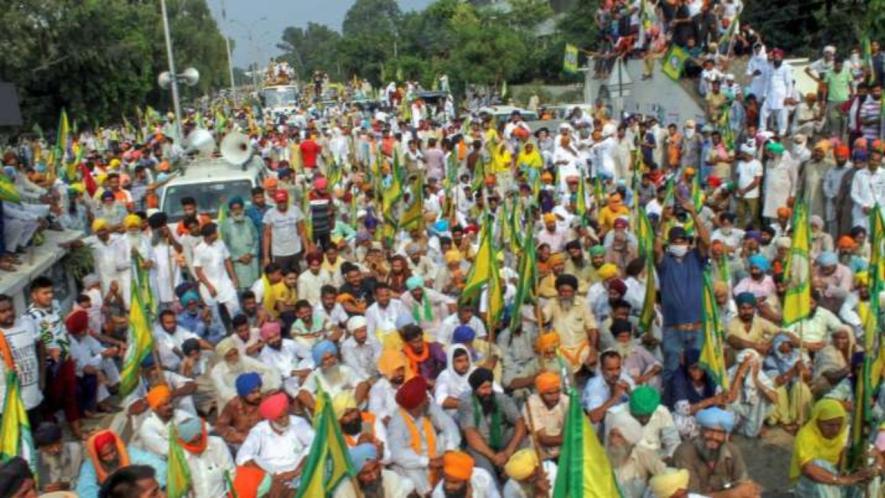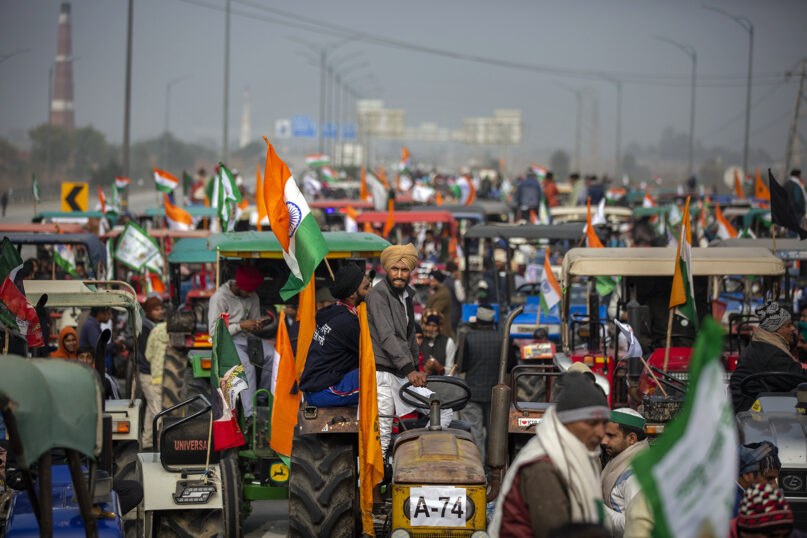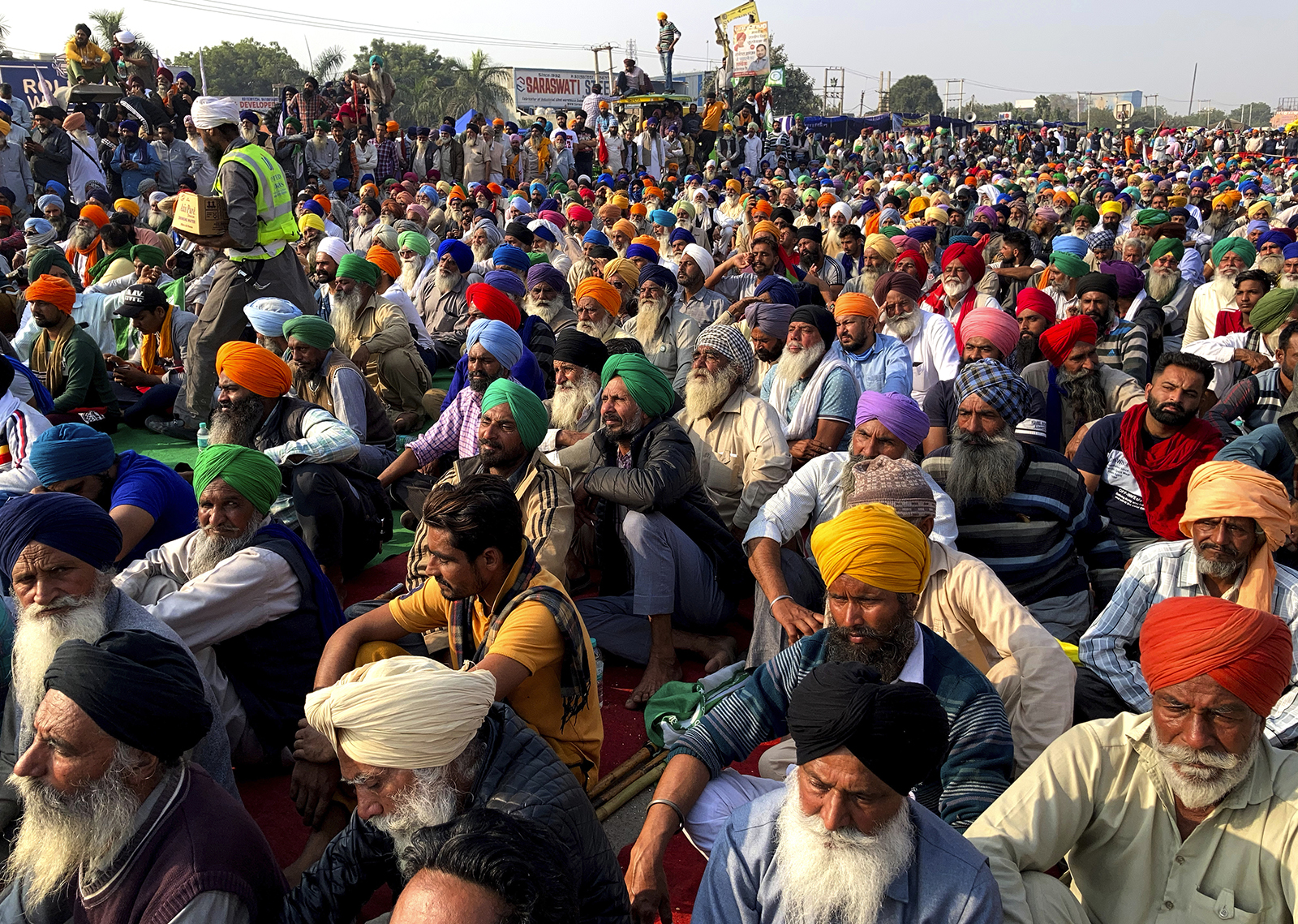Farmers in Over 400 Districts Observe 'Quit WTO Day' Against Inclusion of Agri Sector in WTO Pact
Newsclick Report | 27 Feb 2024
The SKM called for 'Quit WTO Day' on Monday, February 26, in the backdrop of the 13th WTO Ministerial in Abu Dhabi.

The SKM had called for 'Quit WTO Day' on Monday, February 26, demanding the removal of the agriculture sector from the WTO agreement. Farmers observed the protest by parking their tractors on highways in Haryana and Punjab.
The images of tractor rallies with farmers burning the effigies of Union Home Minister Amit Shah, Haryana Chief Minister Manohar Lal Khattar and State Home Minister Anil Vij started pouring in from the morning. The farmers tied the flags of their organisations on their vehicle bonnets and raised slogans like ‘Give MSP now, Boycott WTO, Inquilab Zindabad.’
Apart from SKM, SKM (non-political) and Kisan Mazdoor Morcha (KMM) also observed the protests by burning effigies of WTO at Khanauri and Shambhu borders. These organisations are leading the 'Dilli Chalo' march.
The 'Quit WTO Day' protest came "against the backdrop of the 13th Ministerial Conference of WTO which started on Monday in Abu Dhabi (UAE) and will continue till February 29."
"We demand that agriculture should be taken out of the WTO agreement. It is high time the government understands the concerns of farmers," said Sukhmandar Singh, president of BKU (Rajewal).
Darshan Pal, member of the national coordination committee of SKM, said, "Farmers have realised the threats to the agriculture sector due to the agreements of India with WTO. It is high time the consumers also understand them."
Balbir Thakan, president, All India Kisan Sabha Bhiwani, said anger of farmers could be gauged from the fact that more than 2600 farmers took 1,400 tractors on 10 major state and national highways in the district alone.
Talking to NewsClick over the phone, he said, “Farmers are also understanding that if mustard is being dumped in the Indian market, our prices will crash. We as organisation leaders make common farmers aware about these developments. However, farmers are very much enraged about treatment meted out to common farmers at the borders. We are also gearing up for our huge national meeting of farmers in Ramlila Maidan on March 14.”
According to an Indian Express report, farmers parked their tractors at several locations in the Hoshiarpur district of Punjab, including the Jalandhar-Jammu National Highway. The protesters in Punjab also called for legal guarantees on minimum support price (MSP), pensions for farmers, implementation of Swaminathan Commission recommendations and debt waivers.
Similar protests where farmers parked their tractors on national highways from 12 noon to 3 pm were observed in Haryana's Hisar and Ajnala, Jandiala Guru, Beas and Rayya regions of Punjab.
Meanwhile, there has been no movement in the deadlock between the 'Dilli Chalo' farmer unions and the Punjab government even five days after the death of a young farmer from Punjab.
Jagjit Singh Dallewal, coordinator of SKM (non-political), urged the Punjab Chief Minister Bhagwant Mann to speak to the farmers and register an FIR against the Haryana police officers who allegedly opened fire at the protest site.
"This dharna will continue till our demands are met. Even after the model code of conduct comes into force owing to the upcoming parliamentary elections, this protest will continue. The government may not take any action on the pretext of the election model code of conduct, but we have nothing to do with the elections," said Sarwan Singh Pandher, KMM Coordinator.
Farmers organisations have been maintaining that India’s food security and price support programmes are subjects of repeated disputes at WTO. The major agricultural exporting countries, has proposed a 50% cut in the global level of WTO members’ entitlements to support agriculture by the end of 2034.
In a press statement SKM said,”The issue of public stock-holding is most critical for India especially in view of the ongoing struggles of farmers and workers for the MSP to be fixed at C2+50% level and for a statutory guarantee of the MSP to all farmers. In fact in India, 90% of the farmers are out of the purview of the present system of MSP based on A2+Fl+50% and facing acute agrarian crisis and indebtedness.”
It added: “The resultant intensifying unemployment, poverty and rural to urban distress migration have created precarious situations in the countryside during the least ten years of Modi rule. The Government of India must firmly defend the rights of the country to protect its farmers and ensure national food security. No international institutions or agreements can be allowed to come in the way of these [guarantees].”
The SKM maintained that the Indian government was given a lease in 2014, as an exception for five years, allowing it not to implement conversion of PDS (public distribution system) into cash transfer. “India's food stocking program for PDS is exempted from challenge by WTO members under the temporary peace clause. That is likely to be upturned and if so, India needs to Quit WTO to prevent WTO regulations from interfering in its food security programs and agriculture production,” it said.
Meanwhile, the joint platform of central trade unions too extended its solidarity to the rally and said, “It is most deplorable that these forces violated federal structure and respect to sovereign rights of state governments and used these oppressive measures in the territory of Punjab, not only with water cannons and plastic pellets but metal pellets were also used. Use of drones on the food producer Annadata seeking for their genuine demands was most barbaric. Not only that, the forces went inside Punjab boundary and damaged more than 50 tractors and vehicles of farmers, they continued picking up people at random.”
“We demand judicial enquiry to investigate the killing of the young farmer, to fix responsibility and registration of a case under Sec. 302 of IPC for stringent punishment to the culprit and compensate the farmers for the huge damage done to their tractors and vehicles. The CTUs extend their unequivocal solidarity to the programme called by the SKM for a Mahapanchayat on March 14 at Ramlila ground, Delhi on their demands,” the statement read.















